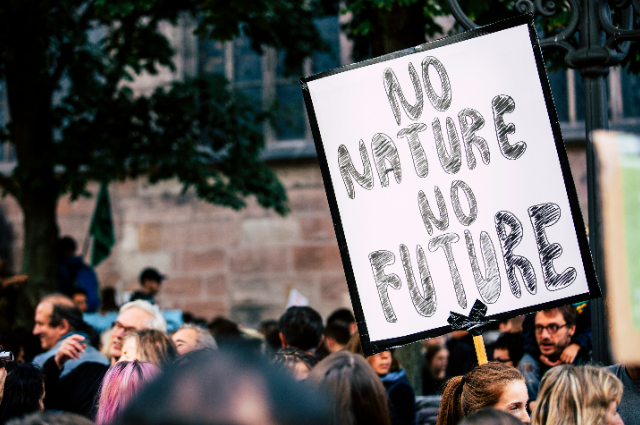
Photo by Markus Spiske on Unsplash
It feels like the world is teetering on the edge of something big in 2025. There's a growing tension in the air, not just politically or economically, but existentially. As a concerned global citizen and an educator deeply invested in the future of our youth, I find myself compelled to speak about what I believe are two of the most pressing, interconnected issues of our time: the resurgence of protectionist trade policies and the accelerating climate crisis.
Both of these issues, though seemingly separate, are intertwined in ways that continue to disrupt global systems, especially in vulnerable economies like India. And while world leaders argue in conferences and boardrooms, the ripple effects are being felt in homes, classrooms, farmlands, and hospitals.
The Return of Protectionism: The U.S. Sets Off a Chain Reaction
Earlier this month, the United States made headlines after announcing sweeping tariffs on imports from across the globe. Almost overnight, a 10% baseline tariff was imposed on most foreign goods, with a staggering 54% slapped on Chinese imports. Even key allies like the European Union and Japan weren't spared.
The stock markets reacted violently, with indexes plunging in what some economists described as the worst single-week drop since the COVID-19 pandemic. (theguardian)
These actions echo the early 20th century policies that once sparked economic downturns and global tension. Many experts argue that reviving domestic manufacturing in a 1950s-style model is neither practical nor forward-thinking. Our economies are no longer linear, industrial powerhouses. They are digital, interconnected ecosystems. As Dr. James Scott from King’s College pointed out, attempting to force a return to outdated economic systems in the name of nationalism is more likely to deepen inequality than create sustainable growth.
India in the Crossfire
For countries like India, the fallout is immediate and personal. Indian pharmaceutical companies, which have long exported affordable generics to the U.S., are staring down the barrel of a proposed 25% tariff. This isn't just a business issue because it affects lives. Reduced exports could mean budget cuts, job losses, and a significant slowdown in one of India's most globally respected industries. (drishtiias)
Additionally, as freight costs rise and global trade routes become less predictable, Indian exporters across various sectors are finding it harder to stay competitive. For a country still grappling with high youth unemployment, this could be disastrous.
The Climate Crisis: A Silent, Relentless Threat
While trade tensions grab headlines, climate change continues its relentless assault. The world recently crossed a chilling milestone: the global average temperature rose 1.6°C above pre-industrial levels, breaching the Paris Agreement's recommended threshold. For India, 2024 was officially the hottest year on record, with increasingly erratic weather patterns, devastating droughts, and frequent floods making life precarious for millions. (wikipedia.org)
One of my students recently asked, "Will we even have winters when I’m old?" It was a chilling reminder that the consequences of our inaction are already becoming part of our children's psyche.
Despite India's ambitious renewable energy targets, its reliance on coal remains high. Many solar and wind energy projects rely heavily on imported technology, much of which is now under threat due to trade barriers. This vicious cycle, where climate goals are hindered by economic policies, only serves to illustrate the interconnectedness of these crises.
Internal Challenges: Pollution, Infrastructure, and Governance
India faces a host of domestic challenges as well. With 42 of the 50 most polluted cities in the world located within its borders, the health toll is staggering. Respiratory diseases are on the rise, and poor waste management continues to strain already overburdened municipal systems. And yet, when budgets are slashed due to falling revenues or trade losses, it is these very areas- healthcare, sanitation, infrastructure that suffer first.
A Generation's Anguish and Urgency
What strikes me most is how young people across the world are responding. From Melbourne to Mumbai, they are disillusioned, anxious, and angry. In Australia, for instance, young voters cite climate change, unaffordable housing, and rising living costs as their top concerns. Many of them feel let down by traditional political systems that prioritize corporate interests over human futures. (theguardian)
In my own classrooms, students express a mix of dread and defiance. They want to know why they should study for jobs that may not exist or invest in homes they may never afford. It’s heartbreaking and galvanizing at the same time.
The Way Forward: Resilience Through Reform
We need urgent and intelligent reform. Protectionist policies may provide short-term political wins, but they jeopardize long-term stability. Instead of retreating behind tariff walls, countries should be strengthening multilateral trade alliances, especially with developing nations that can offer both markets and innovation.
India, for its part, must diversify its export markets and reduce dependency on vulnerable trade routes. Investing in homegrown clean tech, revamping infrastructure, and improving state capacity for disaster response must be top priorities.
Globally, there needs to be a recommitment to climate agreements and international cooperation. Climate change does not respect borders or election cycles.
A Personal Hope
As someone who teaches the next generation, I see both despair and determination in my students. They are not looking for utopias. They are looking for honesty, opportunity, and sustainability. And while the challenges of 2025 are daunting, they also offer us a rare chance to rebuild our systems with empathy, intelligence, and shared purpose.
We cannot afford to get this wrong!
